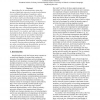Free Online Productivity Tools
i2Speak
i2Symbol
i2OCR
iTex2Img
iWeb2Print
iWeb2Shot
i2Type
iPdf2Split
iPdf2Merge
i2Bopomofo
i2Arabic
i2Style
i2Image
i2PDF
iLatex2Rtf
Sci2ools
HICSS
2005
IEEE
2005
IEEE
Knowledge Flow in Interdisciplinary Teams
Knowledge flow in interdisciplinary teams has become of particular interest as research and alliances cross traditional disciplinary boundaries, and as computing is applied in any domain. The problem is how to share and/or pool knowledge toward a common goal among people with diverse backgrounds. To understand the needs of such groups, it is important to find out what knowledge and learning flows form the basis of their relationships. To explore this, social network data were collected from members of three interdisciplinary teams about what they learned from their closest 5-8 co-workers, and what co-workers learned from them. Results show exchange of factual knowledge to be only one of a number of learning relations that support the teams. Other important relations include learning the process of doing something, information about methods, engaging jointly in research, learning about technology, generation of new ideas, socialization into the profession, access to a network of contac...
Biometrics | Closest 5-8 Co-workers | HICSS 2005 | Interdisciplinary Teams | System Sciences | Traditional Disciplinary Boundaries |
Related Content
| Added | 24 Jun 2010 |
| Updated | 24 Jun 2010 |
| Type | Conference |
| Year | 2005 |
| Where | HICSS |
| Authors | Caroline Haythornthwaite |
Comments (0)

